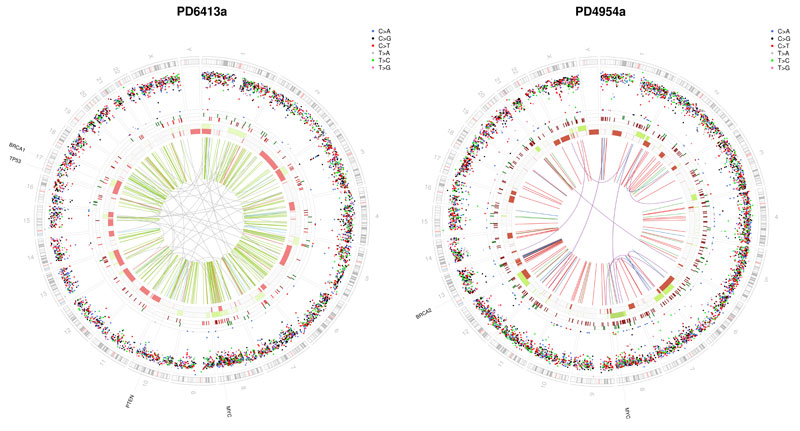Five new breast cancer genes found

The largest-ever study to sequence the whole genomes of breast cancers has uncovered five new genes associated with the disease and 13 new mutational signatures that influence tumour development. The results of two papers published in Nature and Nature Communications also reveal what genetic variations exist in breast cancers and where they occur in the genome.
Dr Serena Nik-Zainal of the Wellcome Trust Sanger Institute led analysis of 560 breast cancer genomes; 556 from women and four from men. This international collaboration included breast cancer patients from around the world, including the USA, Europe and Asia.
The results reveal more about the causes of breast tumours and provide evidence that breast cancer genomes are highly individual.
Each person’s cancer genome is a complete historical account of the genetic changes that they have acquired throughout life. As a person develops from a fertilised egg into adulthood, the DNA in their cells gather genetic changes along the way. This is because human DNA is constantly being damaged by things in the environment or simply from wear and tear in the cell. These mutations form patterns, or mutational signatures, that we can detect and they give us clues about the causes of cancer.
Dr Nik-Zainal’s team hunted for mutations that encourage cancers to grow and looked for mutational signatures in each patient’s tumour. They found that women who carry mutations in the BRCA1 or BRCA2 gene, and so have increased risk of developing breast and ovarian cancer, had whole cancer genome profiles that were highly distinctive from each other and were also very different to other breast cancers. This discovery could be used to classify patients more accurately for treatment.
“In the future, we’d like to be able to profile individual cancer genomes so that we can identify the treatment most likely to be successful for a woman or man diagnosed with breast cancer. It is a step closer to personalised healthcare for cancer.”
Dr Serena Nik-Zainal of the Wellcome Trust Sanger Institute
Exactly where mutations occur in breast cancer genomes is important too. Collaborator Dr Ewan Birney From the European Bioinformatics Institute, used computational techniques to analyse the sequence of genetic information held in each of the sample genomes.
“We know genetic changes and their position in the cancer genome influence how a person responds to a cancer therapy. For years we have been trying to figure out if parts of DNA that don’t code for anything specific have a role in driving cancer development. This study both gave us the first large scale view of the rest of the genome, uncovering some new reasons why breast cancer arises, and gave us an unexpected way to characterize the types of mutations that happen in certain breast cancers.”
Dr Ewan Birney, from the European Bioinformatics Institute
“All cancers are due to mutations that occur in all of us in the DNA of our cells during the course of our lifetimes. Finding these mutations is crucial to understanding the causes of cancer and to developing improved therapies. This huge study, examining in great detail the many thousands of mutations present in each of the genomes of 560 cases brings us much closer to a complete description of the changes in DNA in breast cancer and thus to a comprehensive understanding of the causes of the disease and the opportunities for new treatments.”
Professor Sir Mike Stratton Director of the Wellcome Trust Sanger Institute
More information
Funding
The work for both papers has been funded through the ICGC Breast Cancer Working group by the Breast Cancer Somatic Genetics Study (BASIS), a European research project funded by the European Community’s Seventh Framework Programme (FP7/2010-2014) under the grant agreement number 242006; the Triple Negative project funded by the Wellcome Trust (grant reference 077012/Z/05/Z) and the HER2+ project funded by Institut National du Cancer (INCa) in France (Grants N° 226-2009, 02-2011, 41-2012, 144-2008, 06-2012). The ICGC Asian Breast Cancer Project was funded through a grant of the Korean Health Technology R&D Project, Ministry of Health & Welfare, Republic of Korea (A111218-SC01).
Publications:
Selected websites
EMBL-EBI
The European Bioinformatics Institute is part of EMBL, and is a global leader in the storage, analysis and dissemination of large biological datasets. EMBL-EBI helps scientists realize the potential of ‘big data’ by enhancing their ability to exploit complex information to make discoveries that benefit mankind. It is a non-profit, intergovernmental organization funded by EMBL’s 21 member states and two associate member states. Its 570 staff hail from 57 countries, and work with a regular stream of visiting scientists throughout the year. EMBL-EBI is located on the Wellcome Genome Campus in Hinxton, Cambridge in the United Kingdom.
The Wellcome Trust Sanger Institute
The Wellcome Trust Sanger Institute is one of the world’s leading genome centres. Through its ability to conduct research at scale, it is able to engage in bold and long-term exploratory projects that are designed to influence and empower medical science globally. Institute research findings, generated through its own research programmes and through its leading role in international consortia, are being used to develop new diagnostics and treatments for human disease.
The Wellcome Trust
The Wellcome Trust is a global charitable foundation dedicated to improving health. We support bright minds in science, the humanities and the social sciences, as well as education, public engagement and the application of research to medicine. Our investment portfolio gives us the independence to support such transformative work as the sequencing and understanding of the human genome, research that established front-line drugs for malaria, and Wellcome Collection, our free venue for the incurably curious that explores medicine, life and art.


